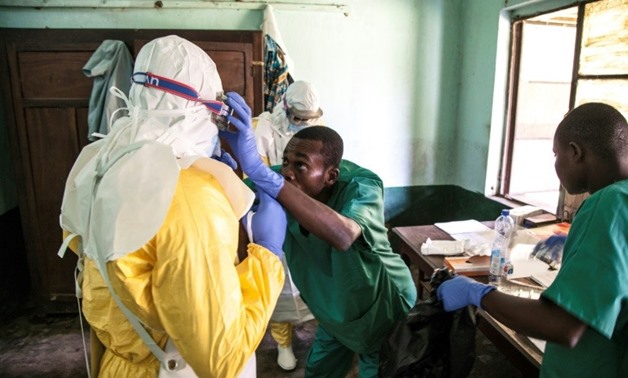
Health workers don protective gear before examining suspected Ebola patients at Bikoro hospital in DR Congo's Equateur province
CONGO - 19 May 2018: The Democratic Republic of Congo joined with world agencies and neighbouring countries on Friday in boosting the response to an Ebola outbreak in the sprawling country's northwest, as the death toll mounted.
The health ministry declared it had activated an "action plan" in the city of Mbandaka after a case of Ebola was confirmed there.
After visiting Mbandaka and launching a coordination centre there, Health Minister Oly Ilunga announced on television that all health care would be free.
"Financial hurdles should not in any way be a brake to having access to health care, especially at a time of epidemic," Ilunga said.
In Geneva, the UN's World Health Organization (WHO) reported that the death toll had risen by two, to 25. Forty-five cases have been recorded, 14 of which have been confirmed by lab tests.
A WHO panel debated whether the outbreak should be labelled "a public health event of international concern" -- a move that would step up global action -- but decided this step was not "currently" necessary, the agency said.
Alarm bells sounded on Thursday after the outbreak, previously reported in a remote rural area, notched up its first confirmed case in a city -- bad news for rolling back the notorious virus.
"The confirmed case in Mbandaka, a large urban centre located on major national and international river, road and domestic air routes increases the risk of spread within the Democratic Republic of the Congo and to neighbouring countries," the WHO said.
"WHO has therefore revised the assessment of public health risk to very high at the national level and high at the regional level," it said.
"At the global level, the risk is currently low. As further information becomes available, the risk assessment will be reviewed."
- Region on 'high alert' -
Separately, the UN's migration agency said it was helping DRC's health ministry to send disease-tracking experts and medical staff to monitor travellers at 16 border points.
The operation was enabled by funding of $75,000 (64,000 euros) from Japan and $100,000 of internal funds, the International Organisation for Migration (IOM) said.
A regional bloc, the East African Community -- five of whose six members have borders with the DRC -- said it was on "high alert" and had put in place measures to screen travellers arriving from that country.
The DRC branch of the International Committee of the Red Cross (ICRC) said it had mobilised more than 200 volunteers.
The fresh outbreak, publicly declared on May 8, was first reported in Bikoro, a rural part of Equateur Province, about 150 kilometres (90 miles) from Mbandaka.
Ebola is both lethal and highly contagious, which makes it difficult to contain -- especially in urban environments where people are mobile and come into more contact with others.
Lacking an arsenal of drugs to treat the virus, doctors isolate patients and trace people who have been in contact with them.
This is a major task even for medical services in rich countries, but the DRC is one of the world's poorest countries.
Four times the size of France, the country has been chronically unstable and episodically racked by violence since it gained independence from Belgium in 1960.
Hospitals, roads and electricity are all major problems, especially in remote areas.
- 'You don't see any change' -
In Mbandaka, an AFP reporter who visited the city's river ports on Friday found staff had been issued with infrared pistol thermometers to check travellers for high temperatures, soap and basins of water, as well as logbooks for writing down travellers' names and addresses.
Police also stepped up deployment at key intersections in the city, whose population is estimated at up to 1.2 million.
But several people who spoke to AFP said the city's safety net had many holes in it.
"What kind of 'action plan' is this?" asked local resident Gaston Bongonga.
"Delegations come here and then go, but on the ground, you don't see any change. They were all unable to hold back Ebola in Bikoro because they don't do anything effective."
"I come from Bikoro," a man called Abraham told AFP.
"There are only two checkpoints on more than 100 kilometres (60 miles) of road in the villages of Kalamba and Ndenga.
"This isn't effective because many people travelling by motorbike or on foot evade inspection.
- Worst outbreak -
Ebola is notorious for its high fatality rate and extreme symptoms, which can include internal and external bleeding.
The current outbreak -- the ninth to hit the DRC since Ebola was identified in 1976 -- involves the same strain of the virus that struck three West African countries in 2013-15 and sparked an international panic.
It went on to kill more than 11,300 people, in the deadliest ever Ebola epidemic.
The WHO was fiercely criticised over its handling of the epidemic and has pledged to improve its emergency response.
There is no licensed drug to treat or prevent Ebola, although an experimental vaccine arrived in the DRC on Wednesday and has been cleared for use by the Kinshasa government.


Comments
Leave a Comment